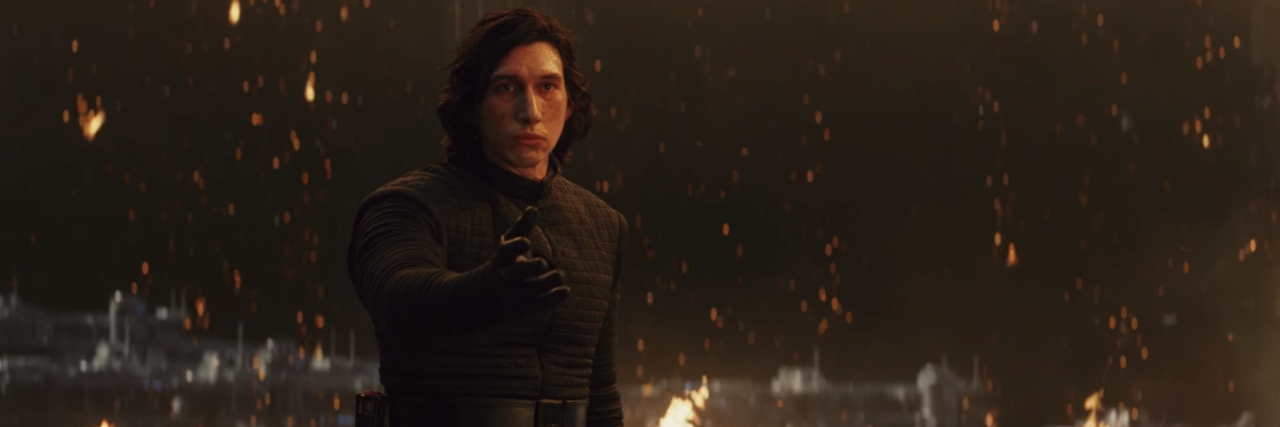Why You Might Relate to Kylo Ren From 'The Last Jedi' If You Live With Addiction
Editor's Note
If you or a loved one is affected by addiction, the following post could be triggering. You can contact SAMHSA’s hotline at 1-800-662-4357.
This article contains full spoilers for “Star Wars: The Last Jedi.”
“Kylo Ren is too wimpy,” a friend’s son-in-law said when I asked him about “Star Wars: The Last Jedi.” “His character seemed to whine through the whole movie.”
As he spoke, I tried to figure out this funny ache just below my first few ribs. Where he saw a wimp, I saw a young man in pain.
Maybe it was because Adam Driver can actually act, but the pain he gave Kylo Ren’s character haunted me. Driver’s performance embodies Kylo Ren’s inner turmoil in a way that was unexpectedly nuanced. The way he first saves and then betrays Rey left me shattered. Who knew a space western with lightsabers would follow me with such tender agony? But there was something familiar in this torture.
I somehow knew the feeling of connection when Kylo Ren came out of his long haze of anger and turned into a person really looking at himself. I also somehow remembered that such clarity usually only lasts a moment. I had already experienced the charming, convincing person with undeniable ability who cut themselves free, only to once again get tangled. Oh shit, I realized; Kylo Ren is an addict. Oh shit, I realized; I just watched Kylo Ren relapse.
I felt silly writing it down but there it was — the personal terror of addiction articulated in the Dark Side, the Dark Side that whispers, “take the pills, eat the chocolate, swipe the credit card.”
Addiction is also glamorous, and the Dark Side knows it. This is why Rey is sleeping on a rock in some backwoods planet and is flying around in the ratty Millennium Falcon, while Kylo Ren has his own luxury suite and a shiny command ship. In both a galaxy far far away and down here on Earth, recovery and sobriety just don’t have the same glittery fix as addiction. “Come on,” someone implores in an expensive bar in the posh part of town or in a wonderfully gritty nowhere dive. “One glass won’t kill you.”
Even if it’s glamorous or “cool,” the trouble with the Dark Side and addiction is that we don’t get to decide what it numbs. Sure, our drug of choice can dull a troubled relationship with our families, it can seemingly ease off the sting of mental illness, momentarily fill an empty space left by loss or muffle the constant screams from the media that we are inadequate, but it also makes pretty much everything else hollow. There was a reason Rey didn’t take Kylo’s hand when he asked her to join him; there is a reason I don’t completely believe it when people tell me how amazing I am when both of our words slurred from a night out.
As glamour and numbness wear off and the hangover starts, addiction also has the nasty habit of leaving us isolated. This reminds me of that scene from “The West Wing” where Leo McGarry explains, “I don’t get drunk in front of people, I get drunk alone.” The same goes for Kylo Ren and the Dark Side; the fact he is alone in most of his scenes makes sense. He wouldn’t go up to Princess Leia and say, “sorry, Mom, I need to go hide in an X-Wing and binge.” Instead, he runs away and barricades himself behind enemy lines. Addiction breeds isolation, but isolation also enables addiction.
But we aren’t alone. Struggles with addiction are ridiculously common. Perhaps it is when we are finally brave enough to reach out and say “hey, me too,” that we can face the monster.
Author and columnist Neil Steinberg writes that the choice of recovery is the way of the hero. The way of the hero is harder, and failure is common, but heroes fight anyway. And perhaps “The Last Jedi” can finally be the romanticized journey to recovery we always need and Rey, not Kylo, is our hero.
Rey has a lot to numb: poverty, abandonment, loss. Just like Kylo, she has to grieve over a set of parental figures who didn’t just make the usual mistakes that parents make, but ones who deeply failed her. Unlike Kylo, her alliance with the Rebels also makes her future maddeningly uncertain. At first, she buries it with a classic case of perfectionism. It is as if Rey believes, if she just keeps working, she won’t have to face the things that trouble her, but as she matures, Rey learns to address her problems head-on. A little at a time, she learns to stare straight into her own pain and accept it as what it is. Of course, she feels the pull of the Dark Side, but despite the temptation and of course the age-old blunder of trying to change it, she can see it as what it is: an expensively dressed falsehood.
So maybe my friend’s son-in-law had a point. Kylo is wimpy. He is “wimpy” because his undeniable charisma and ability have been eroded away by the “Dark Side.” However, it is too easy to write off an addict as the villain. Instead, we must question how he got there and also what we must do to face it in ourselves.
If you or a loved one is affected by addiction and need help, you can call SAMHSA‘s hotline at 1-800-662-4357.
We want to hear your story. Become a Mighty contributor here.
Image via YouTube

